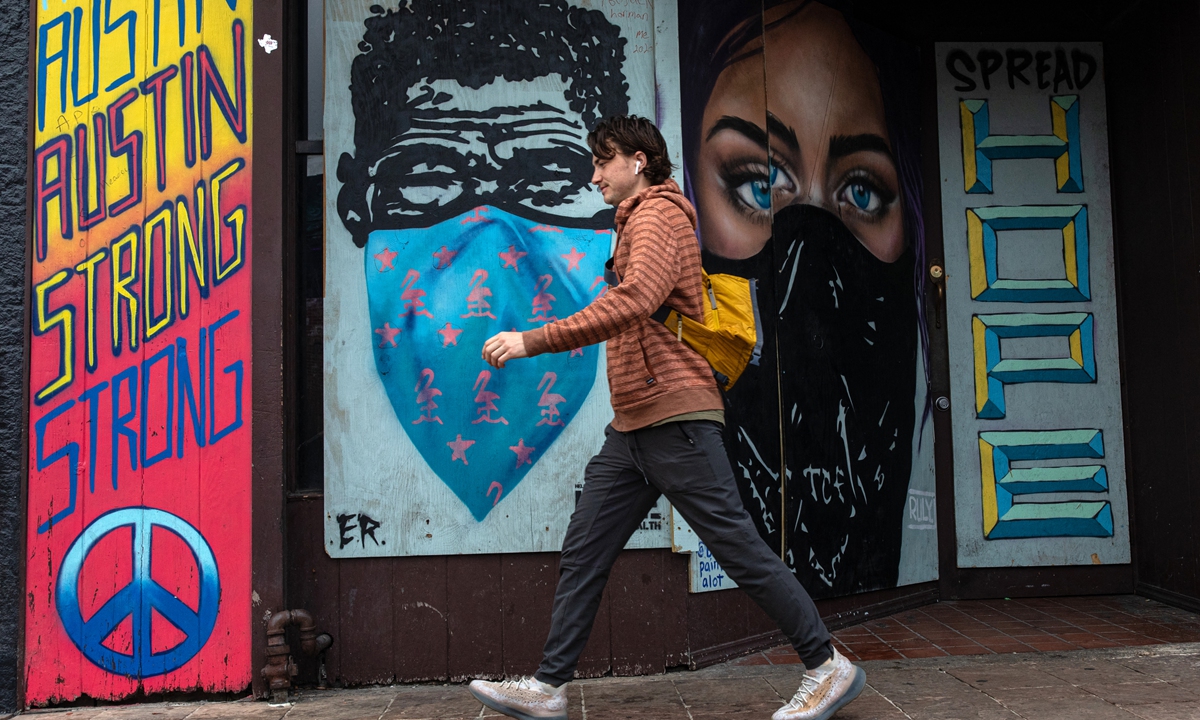
A man passes murals of masked faces on the boarded-up windows of a bar on Sixth Street in Austin, Texas, on March 10. Photo: AFP
"It's great to be able to see people's faces - you don't see them smile underneath their masks," said Tom Williams, who on a recent trip to Texas was discovering the big state's decidedly casual approach to COVID-19.
Sitting in a Houston bar, he was struck by the contrast between the laid-back attitude of clients there and the far more cautious approach prevailing in his small hometown of Steilacoom, near Seattle, in faraway Washington state.
To suddenly set foot in the "post-pandemic world," without mask or physical barriers, left the 50-year-old physician - in Texas with his daughter for a volleyball tournament - feeling elated.
A month ago, Texas, the second most populous US state, cited increasing vaccinations as it dropped a requirement to wear masks in public places and ended all virus-related curbs in private establishments, which are now free to set their own restrictions, if any.
In a courtyard where tables sit among wheelless vintage pickups, the Truck Yard welcomes clients to partake in its margaritas, as well as spring crawfish, tacos, pizzas or burgers from a rotating cast of food trucks.
Guests are free to wear a mask or not. Roughly half of them don't bother.
On this weekend evening, the sprawling establishment - known for its 80-year-old Ferris wheel - is buzzing, full of fans of Houston's professional baseball team the Astros, who play in a nearby stadium limited to 50 percent capacity.
One fan, 22-year-old Chris Chambers, admitted to not being "very careful" about the coronavirus in recent months.
"I got married, I got engaged, I've been to two weddings. I've been in bars like this and haven't gotten it so… I don't know," he said.
In Houston, new cases are down sharply since the start of 2021, but health officials say the virus remains concerning.
Much will depend, they say, on how quickly the city's "super-spreading" college students get vaccinated.
One-third of Texans have already received at least one dose of the vaccine, which has been available to all adults since March 29.
But Chambers hasn't yet bothered.
"My mom got her shots, so I don't feel worried about that," he said.
As a young man in good health, he said, he expects that if he does fall ill with the virus, "I think I'd recover within a week and everything will be fine."
Another client, Matthew Diaz, who takes remote classes in finance from a New York school, said that "since last May, we haven't given any care at all about COVID[-19]."
For him, the easing of restrictions has changed little.
"The only thing that has been changed is the law," he said, but "in Texas, that's secondary. In Texas, it's always been what we believe, first, and second, what the government wants us to believe."
Truck Yard's soft-spoken manager David Foreman said he hasn't noticed any particular drop in business in recent months. COVID-19 or not, he said, what matters is the weather.
Some businesses received threats on social media when they decided, as the law allows, to no longer require customers to wear masks.
But Foreman said restaurants, with a somewhat older clientele, were more affected than his bar, which caters to a young crowd.
In a trailer turned into a stage, Morgan McKay opened her guitar case, on which are printed the words: "Don't mess with Texas Music!"
She was to perform later, standing between large, spray-painted portraits of Johnny Cash and Willie Nelson, who in the 1960s helped found the Outlaw country music movement in Texas.
"I feel so great to be out of the house and back to feeling normal again," said McKay.
Since the state dropped its virus restrictions, she has had more work than she can handle.
"I feel very blessed," she said. "March was crazy. April is going to be crazy."



